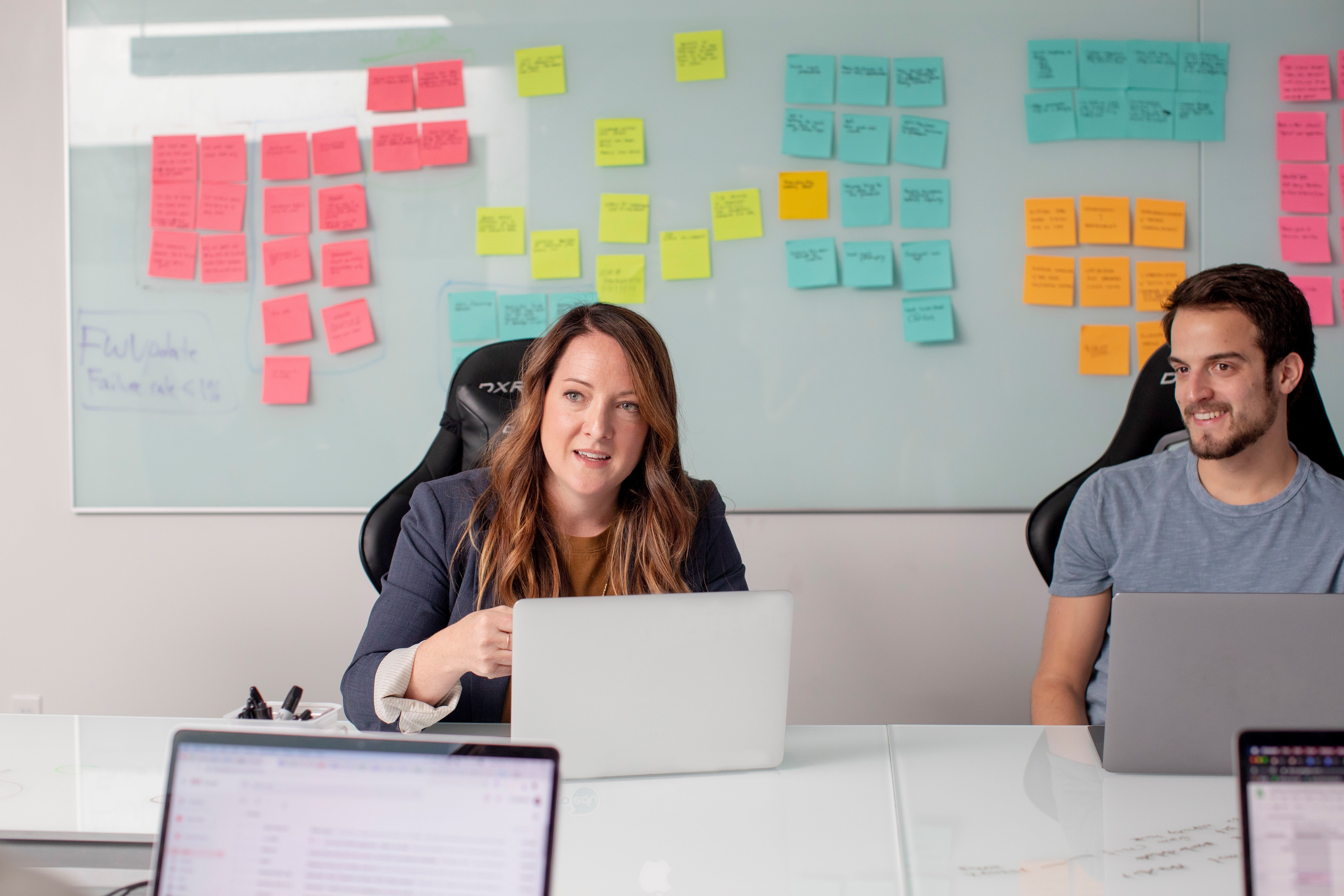Empowering Women in Tech is an interview series by Templeton & Partners, designed to provide a platform for women in the tech industry to exchange experiences, gain insights, and draw inspiration from one another's journeys.
In our current feature, we had the privilege of engaging with Renel Holland, a dynamic and highly accomplished PMO professional with extensive expertise in project and programme management, particularly within the realm of IT transformation and change initiatives. Her illustrious career has witnessed collaborations with esteemed organisations such as Deutsche Bank, JP Morgan, and Nationwide, where her focus on optimising project processes, ensuring strategic alignment, and consistently delivering outstanding outcomes has set her apart as a true industry leader.

Renel's career trajectory evolved from executive assistant roles to her current role as a PMO specialist. What truly distinguishes Renel is her unwavering commitment to empowering her colleagues and peers. She places immense value on transparent communication, empathy, and personal growth, qualities that have proven invaluable in surmounting professional challenges.
Renel's remarkable resilience is evident in her personal journey as well, where she has confronted adversity with unwavering determination. Her narrative serves as a compelling testament to her inner strength, character, and unwavering dedication to championing the cause of women in the workforce.
Renel, I did some research on your background, and it's clear you've had quite an impressive career journey. Could you share some of the key highlights and experiences that have brought you to where you are today?
Certainly! It's been quite a unique path. I started my professional journey primarily as an executive assistant but soon found myself immersed in project management tasks such as office openings and relocations.
My interest in project management led me to explore the world of PMO (Programme Management Office). To gain more expertise in this field, I made a pivotal move to Capco, a renowned consulting company. During my four-year tenure at Capco, I focused on upskilling myself and provided PMO support to various clients, collaborating closely with different partners on client sites. This period marked my transition into the PMO space.
I had the privilege of working with major clients like JP Morgan, Deutsche Bank, and Nationwide, primarily in the FinTech and financial services sectors. My responsibilities included ensuring smooth project and programme onboarding, ensuring everyone had the necessary resources, and even making sure they had the right equipment. Over time, I also delved into the governance framework, handling tasks related to reporting, executive suite interactions, and stakeholder management.
After this enriching four-year stint, I was headhunted by Deutsche Bank to work as a contractor, marking a significant shift in my career in 2015. As a limited company contractor, I primarily focused on IT transformation and change programmes, with a strong emphasis on HR-related initiatives, such as the implementation of Workday. I acted as the bridge between project delivery teams, vendors, and C-suite executives, ensuring seamless communication and alignment.
This role gradually steered me towards my current position, where I concentrated on strategy alignment. I ensure that programmes invest in the right resources and align with our vision and strategies. One of the standout moments in my career was my involvement in Deutsche Bank's major programme in 2019, where they implemented Workday for HR, payroll, and finance on a global scale. As a PMO specialist reporting to the HR director, I played a crucial role in setting best practices, establishing standards, and overseeing reporting and governance, all while managing typical PMO tasks.

But it didn't stop there; I became the go-to person, almost like a Center of Excellence for the program. With the programme rolling out to 80,000 people worldwide, it was an intensive experience, involving collaboration across domains, cultures, and with diverse stakeholders. I also didn't hesitate to step in where needed. For instance, when the test manager left the organisation, I took on the task of ramping up a team of 380 testers. This involved coaching them on test scripts, and testing procedures, and even preparing them for testing and post-testing phases. I was also deeply involved in the training side of things, creating content, coordinating training sessions, and ensuring all logistics ran smoothly.
Extensive stakeholder management was another critical aspect of this role. The programme successfully went live within eight months, even though my initial contract was for three months. I tend to form strong connections with teams, and they often see the value I bring, leading to contract extensions. In this case, I stayed on for a total of eight months.
What I particularly enjoyed about this experience was that it allowed me to get involved in various facets of the programme, not just the project management aspects but also diving deeper into the details to ensure successful delivery.
I'd like to learn more about your background and what led you to choose this career path. Could you tell us about your educational journey? Did you always know this is where you wanted to be?
My educational background has an interesting twist. I actually went to school in South Africa, where I spent a significant part of my early years. However, my family's roots are British, so, eventually, we made the decision to emigrate back to the UK.
Upon arriving in the UK, I was fortunate enough to secure a position within just three days. My initial plan was to work as an executive assistant, specifically supporting the Managing Director at Air Charter service. In this role, I discovered my penchant for coordinating tasks and projects, always on the lookout for things to organise and manage.
This interest led me to pursue various certifications and courses to enhance my skills. I began by becoming certified as an executive assistant and then delved into project management courses. These courses helped me understand best practices and refine my skills further. As I continued my educational journey, I earned certifications such as Prince2 and P3O, in addition to exploring various virtual online courses.
I soon realised that this was where I truly thrived. I enjoyed the dynamic environment of supporting teams, solving problems, and getting things back on track. This realisation guided me towards specialising in PMO roles, where I could leverage my skills to their fullest.
So, to answer your question, I didn't always know that PMO was my destined career path. It was a gradual and organic transition driven by my passion for coordination, problem-solving, and helping teams achieve their best.

Discover: How to Become an IT Project Manager – A Complete Guide for 2023
Having not heard of the term PMO before, I did a bit of research myself, and I learned that “P” stands for three things: Project, Programme, and Portfolio. It seems you're working on the programme part of that. Can you clarify the differences between the three?
It's a common point of confusion, so let's break it down. When you start in this field, especially in the earlier stages of your career, you often begin with projects. These are individual undertakings, such as office relocations or implementing a new IT system. Your role might be that of a project administrator, project support, or project coordinator. It's all about managing the specifics of a particular project.
As you gain more experience and take on additional responsibilities, you progress to working with programmes. For example, when I worked with Ted Baker, I managed a portfolio that consisted of 16 programmes. In this role, I acted as the portfolio manager, reporting the delivery and status of those 16 programmes to HR and IT directors. So, it's a step up from individual projects and involves coordinating multiple related efforts.
Then, at a more advanced level, you have portfolios. At this stage, you might have multiple portfolios, and it's typically the domain of director-level roles. Each portfolio can encompass various programmes and projects. In my experience, I've mostly handled a single portfolio with numerous programmes and projects underneath. It's a bit like wearing many hats and managing a complex web of interconnected initiatives.
Now, regarding PMO, it's essential to understand that the concept has evolved over time. In the past, PMO often functioned as a kind of "centre of excellence." It was more about following a rigid, step-by-step process, typically in a waterfall fashion, to ensure project success. However, things have shifted in recent years. PMO has become more hybrid-oriented. Nowadays, PMOs need to adapt to various business changes and be more flexible. The focus has shifted towards adding value to an organisation and helping them achieve their objectives, all aligned with their vision, strategy, and business plans. So, it's become more about being agile and dynamic rather than adhering to a strict process.
It's also worth noting that PMO structures can vary significantly from one organisation to another. For instance, some larger organisations might have a central "centre of excellence" PMO that oversees everything PMO-related, while individual projects or programmes have their own PMOs. The challenge is tailoring PMO practices to each specific context, making them efficient while still providing the necessary information and support to the central PMO for broader reporting.
I understand it can sound complex, but it's mainly because the PMO landscape varies depending on the organisation's size, maturity, and specific needs.

It's clear that you're in a senior role where you have to manage a diverse group of people, often from different cultures. How do you handle this complex balancing act?
Managing a diverse team can indeed be quite a challenge, but it's also one of the aspects I find most rewarding in my role. I'd say my ability to coordinate and prioritise tasks has been a key asset in maintaining that balance.
In this role, I manage various individuals, including project managers and delivery teams reporting to the programmes. Additionally, I get heavily involved in financial aspects such as budgeting and forecasting, resource management, and even the recruitment process, from interviewing to onboarding. This means dealing with external recruitment agencies, contracting companies, consultancies, and independent professionals like myself. So, it's a highly dynamic and multi-faceted role.
The starting point for me is to align with senior stakeholders, particularly the C-suite, who typically have their strategic plan, vision, and budgets finalised for the year. Their direction sets the tone for our priorities. Effectively, I act as the bridge between their vision and the teams responsible for execution.
Another crucial aspect is adaptability. I adjust my approach and way of working with each person based on their specific requirements and the priorities within the programme. It's about understanding that different individuals and teams may have unique needs and expectations, and my role is to ensure alignment while keeping the broader goals in sight.
We're aware that the tech industry, especially in leadership roles, has traditionally been male-dominated. Have you encountered any biases or challenges in your career due to this dynamic?
During my career, I've definitely faced challenges in dealing with people with different personalities and biases – from working with individuals who have conditions like Asperger's or autism to dealing with people who have no excuse at all for their behaviour.
One of the more daunting challenges came during my time in the banking world. To put it bluntly, there was where I encountered individuals who could be described as male chauvinists. They exhibited a demeaning attitude towards women, treating them as if they were there to serve their every need. I distinctly remember instances where I was asked to fetch tea, make coffee, or handle their lunch orders. This behaviour was not only undermining but deeply disrespectful, and it devalued the contributions I was trying to make to the organisation.
In some cases, I was even told not to communicate with anyone without going through them, effectively enforcing their dominance within the organisation. While one can manage this kind of behaviour to a certain extent, it becomes increasingly degrading when it starts to affect one's professional capabilities as a woman. In such situations, it becomes essential to stand up for oneself, and, if diplomacy doesn't yield the desired results, it's vital to evaluate whether the role is the right fit.
After approximately ten months of dealing with such a challenging environment, I decided it was not worth compromising my values and self-worth. So, I made the decision to move on to other opportunities where I felt I could genuinely contribute and be appreciated for the work I did. It's crucial to find an environment where you're empowered to deliver successfully and where your contributions are acknowledged and respected.

I agree with your perspective, but unfortunately, many women find themselves in situations where they either can't or don't want to leave their jobs. We should indeed seek better alternatives. What advice would you give to women who face such challenging situations?
You're absolutely right; women should never be forced to leave their jobs because of such behaviours. There are steps one can take to address and hopefully improve these situations, especially if you don't have the flexibility of leaving the job, as I did as a contractor.
First and foremost, I would strongly encourage women to speak up. If you're facing a hostile or abusive environment, don't suffer in silence. It's crucial to make someone at the leadership level aware of the situation and don't hesitate to involve HR, especially in more volatile scenarios involving abuse or bullying. Many companies have policies in place to handle such issues, and it's vital that we, as women, start utilising them effectively.
I've been in a similar situation before, where an individual was verbally abusive, used offensive language, and created a hostile work environment. I documented these incidents and reported them to HR, and the person in question was eventually fired after going through a disciplinary process. So, it does work, and it's crucial to have witnesses and documentation to support your case.
The world has evolved, and it's no longer a male-dominated realm. We need to empower and educate people, fostering a culture of respect and equality. If you're not being respected in your workplace, you should question whether it's an environment worth investing your time and energy in.
Organisations are also gradually recognising the need for change, but there can still be challenges stemming from old-school mentalities. However, recent events like the COVID-19 pandemic have forced a re-evaluation of traditional workplace norms. Trusting and respecting employees for the value they bring to the organisation is a fundamental shift that's been accelerated by these changes.
In the end, it's about education, common sense, and a commitment to respect and equality. We need to continually reinforce these principles to ensure a better and more inclusive work environment for everyone, particularly women.
As you mentioned, having allies in the workplace, whether it's your manager or peers, is crucial. Are there any other support systems women can rely on when dealing with workplace challenges?
It's important to acknowledge that not all difficult situations can be resolved solely through workplace relationships. There are instances when additional support is needed. I've been through a particularly challenging situation myself, lasting for about 14 months, as I mentioned earlier.
In such cases, it's essential to be aware of other resources available within an organisation. Many companies offer services that can provide emotional and mental support to individuals dealing with abusive or distressing situations. These services are often in the form of counselling support lines. They can be a lifeline when you're facing tough circumstances.
The great thing about these services is that they are entirely confidential and anonymous. Your details are never shared, ensuring your privacy and protection. It's an external resource within the organisation that can offer guidance and assistance when you might not have the emotional or mental capacity to handle the situation on your own.
So, in addition to seeking support from your peers and management, it's also good to be aware of these resources and take advantage of them when needed. They can provide help during challenging times and serve as an additional support system.

We have also seen that women who have a mentor tend to be better equipped to navigate challenging situations in the workplace and assert themselves more effectively. What are your thoughts on this?
Absolutely, having a mentor can be a game-changer in one's professional journey. Typically, a mentor is someone within or outside your immediate area or team, often a more experienced manager or colleague. Building a positive relationship with a mentor is essential, and it's not about becoming close friends in the traditional sense, but rather about establishing a professional bond.
Having a mentor can offer numerous benefits. First and foremost, it reinforces your credibility and underscores the value you bring to your role. It's an excellent way to showcase your capabilities and expertise within the organisation. Moreover, a mentor can play a vital role in boosting self-esteem, especially in challenging situations. Women, in particular, tend to be more emotionally attuned, and we can sometimes take things personally. Having a mentor allows you to seek guidance and support when you need it most. They can provide invaluable insights, coaching, and a steady hand to guide you through difficult times.
A mentor can serve as a trusted point of contact in case anything goes wrong or if you need advice on how to approach specific workplace issues. In essence, they complement your strengths and help you grow both personally and professionally. So, I'm a strong advocate for mentorship and believe it can significantly impact a woman's ability to navigate the workplace with confidence and resilience.
Especially in industries like tech, many women report struggling with imposter syndrome. Have you ever experienced something like that, and what advice would you give to other women?
I've definitely experienced it throughout my career, and it's a common challenge for many of us. We often question whether we truly belong in the roles we've achieved. In those moments, I find it incredibly helpful to reflect on how far I've come. Compare where you are today to where you started. Recognising your own achievements, even the seemingly small ones, can be empowering. For example, comparing my life now to where I was ten years ago, I have my own car, a house, and a loving family. Those accomplishments, when acknowledged, become significant sources of motivation. So, my advice is always to keep looking back at your journey and celebrating your wins, no matter how small they may seem. It helps combat imposter syndrome and reminds you of your true worth.
As a leader yourself, can you share some of the strategies or approaches you're personally implementing to support your team?
Supporting and empowering my team is at the core of my leadership philosophy. One key strategy I use is to encourage team members to take ownership of their ideas. If someone comes up with a great idea, I'm all for letting them run with it. This not only shows their capability but also provides them with the opportunity to step outside their usual scope of work.
Another approach I find valuable is maintaining strong connections with my team. We have regular check-ins, typically once a week, where we discuss progress, updates, and any challenges they might be facing. These sessions also provide a platform for coaching and mentoring. Given my technical background, especially in IT, I often find team members approaching me with technical queries. I'm more than happy to serve as a knowledge source, walking them through problem-solving and upskilling them as needed.
Personalised one-on-one sessions are also something I invest a lot of time in. I believe in coaching and guiding individuals, helping them develop their skills and overcome obstacles. It's about putting myself in their shoes and asking how I would tackle a particular challenge. Empowerment is a fundamental aspect of my leadership style – it's about giving individuals the autonomy and trust they need to thrive.
Lastly, I believe that empathy is a key component in understanding where each team member is coming from. Whether they're at different levels or going through personal challenges, providing the right support and guidance is crucial for their growth and development. Empowering people and helping them develop themselves is, to me, the ultimate goal of leadership.

You bring up a vital point about not making assumptions, especially when it comes to the unique challenges each one of us faces. Just because we're women, for instance, doesn’t mean we all have the same needs or that we're going through the same things in life. Can you share a moment from your own career where you encountered a particularly challenging situation, and how did you navigate it?
Last year, I underwent thyroid surgery, which unfortunately led to complications, including damage to my voice box. As a result, I lost my voice completely and had to undergo speech therapy for six months. During this time, I was unable to work, and my health became a top priority. In fact, I had to undergo a second surgery because I experienced difficulty breathing.
This presented a significant challenge professionally and personally. On one hand, I needed to focus on my recovery and well-being. On the other hand, financial responsibilities couldn't be put on hold indefinitely. So, despite my health challenges, I took on a three-month project. This project came with its own set of complexities as the previous project manager had left. The organisation wanted to maintain a positive relationship with the client, so I stepped in to assist.
I ended up successfully overseeing the implementation of Workday and cloud payroll across four different regions globally, completing it in a shorter timeframe than initially anticipated. This experience reinforced my belief in stepping up when challenges arise, even in the face of personal difficulties.
However, since completing that project in March, I've been actively seeking new opportunities. Here's where I've encountered a different kind of challenge. The job market has been quite stifled, and it feels like we've regressed to a period resembling a recession. Organisations seem less inclined to invest in areas like IT, system upgrades, or process improvements, which indirectly affects PMOs. In the current climate, there seems to be a preference for business analysts and developers over PMOs. They often view us as problem-solvers who come in after everything else has been tried and tested. This has made finding new opportunities challenging, and I've been out of work for several months.
On a personal note, I'm also dealing with my mother's loss after an intense battle with stage four cancer. So, I'm juggling multiple significant life events simultaneously, including moving into a new house just a few weeks ago.
This experience has reinforced the importance of understanding the unique challenges individuals face. It's a reminder that we never truly know what someone is going through until we take the time to listen and empathise. Challenges in life and work can be unpredictable, and they often come in clusters. For me, it's been a blend of health challenges, career uncertainties, and personal loss, all within a relatively short period.
Your resilience and determination are truly inspiring. When faced with challenging times, it's evident that you've managed to keep pushing forward. Do you have any specific advice for other women who might find themselves in difficult positions, whether professionally or personally, to help them stay motivated?
I've always believed that when you're going through tough times, it's like a test of your character. You can either face the world head-on, with a smile on your face, and an attitude that says, "I can overcome this," or you can let it overwhelm you. Personally, I'm a fixer; I've always been someone who takes action to solve problems.
My advice to other women is, first and foremost, don't keep it all bottled up. We have a tendency to internalise our struggles, but it's essential to talk to someone. Whether it's a friend, a colleague, or a peer, having someone to confide in and lean on when needed is invaluable. Even though we often carry the weight of the world on our shoulders, there are moments when we need another shoulder to lean on.
Secondly, it's vital to recognise your own limits and respect yourself. Understand that it's okay to take a step back when you need to. If you find yourself facing something overwhelming, don't be afraid to take a break, gather your thoughts, and then come back to it with a refreshed perspective. The key is to never give up; resilience often means finding different paths to your goals.

A big thank you to Renel for sharing her inspiring career and life journey with us.
Our Diverse and Inclusive Approach to Recruitment
Templeton has over 27 years of experience recruiting highly skilled and diverse IT contractors across the world – Find out more about our award-winning tech recruitment services.
Are you looking for a role in IT?
We provide contract tech jobs in 40 countries worldwide, and our diverse, international team is on a mission to find the right one for you. Get in touch with us today!
From the same series:
- Empowering Women in Tech – An Interview with Thérèse Struik
- Empowering Women in Tech – An Interview with Chibuzo Igwe
- Empowering Women in Tech – An Interview with Maya Jantchi




